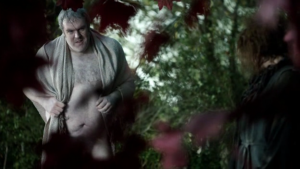Hey, did you see that swords-and-swordplay drama on HBO? The one with all the violence and nudity?
You mean Rome?
That was like six years ago. I mean the recent one! With all the political scheming.
You mean The Borgias?
No, that was on Showtime. I mean the one with witches and magic wolves and prophecies.
You mean Camelot?
That was on Starz! I mean the one with Peter Dinklage.
Peter Dinklage wasn’t in The Tudors.
ARRRGH!
Screwball comedy aside, you’d be forgiven for confusing the many, many period dramas that have aired on premium cable in the last six years. A short list includes Rome, The Tudors, Deadwood, Spartacus, Boardwalk Empire, The Borgias, Camelot, Game of Thrones and doubtless several that I’m missing. The historical eras depicted by these films span thousands of years – and even enter the realm of fantasy – and several continents. But they all share one genre. In this genre, familiar stories are retold with an emphasis on violence, sex and dishonest scheming.
If there’s not a better name for this genre, I’m calling it Blood, Tits and Scowling.
Blood
As the first element of the genre, people have to die onscreen. And it’s got to be messy.
(video SFW, but with plenty of CGI splatter)
Even in stories where death is frequent, a death never has to be depicted onscreen. Several of Shakespeare’s most violent plays contain just as many offstage deaths as on. And even if it is depicted onscreen, a death never has to be bloody. Years of Westerns and war movies have conditioned us to the bark of a gunshot, the nameless henchman doubling over, and immediate stillness.
This is common sense, but I bring it up here just as a reminder. It’s easier to film a bloodless death than a bloody one. It’s hard to make fake blood, apply it at the right moment, and edit a series of frames together to make sure the blood appears after the loser has been stabbed and not before. So to wallow in gore as much as Spartacus, Game of Thrones and Rome do is a conscious choice. The producers set aside a portion of the budget for blood. Why? What is this in aid of?
Tits
Of course, if we have all death and no sex, it’s just The Seventh Seal. If critics of pop culture have taught us anything over the last hundred years, it’s that violence and sex must be intertwined in a confusing display. Our heroes must be equally capable of both dispatching armies of goons and of seducing the ingenue. Only once the sexification of violence (or the adrenalizing of pornography, either/or) is complete will Hollywood’s work be done.

History!
The draw of sex is a big part of premium cable. Since HBO, Showtime and the other premium channels don’t rely on sponsors for revenue, they don’t have to worry about turning off any skittish marketing departments. Plus, in an era where a basic cable subscription will get you 70 channels for free, producers have to come up with reasons for viewers to shell out an additional $20 a month. Two pale, firm, bouncing reasons.
(Or one thick, dangling reason, but that’s pretty clearly an afterthought)

Hodor!
Scowling
Lest critics write your period drama off as an exploitative display of sex and violence, however, you need some intrigue. People need to scheme against each other. You need a lot of whispered conferences in rooms with vaulted ceilings. Documents need to be obtained and passed along. Blackmail, espionage and deceit are the orders of the day.
The presence of political intrigue in these dramas should draw our attention for three reasons. First, scheming is typically considered a function of reason (higher level), while sex and violence are considered baser instincts (lower level). Perfumers are experts in blending top and bottom scents to create a complex olfactory experience. The producers of these shows are equally good at blending higher level intrigue and lower level carnality.
(Is the sex and violence a means to attract people to the intrigue? Or is the intrigue a gloss for the sex and violence? That’s one for the comment thread)
Second, scheming isn’t a necessary part of the genre. It doesn’t go hand in hand with violence and sex. You could depict a troop of 14th-century mercenaries screwing and slaughtering their way across France without adding in a lot of scheming. Or, for a less depressing visual, you could depict a bunch of sexy super-spies who jet around the globe stopping terrorists. Either way! The point is, there’s nothing inherent in sex and violence that requires intrigue.
Also, note that the genre requires not just scheming, but scowling. We can’t have heroes who are surrounded by dishonorable curs. We have to have plotters who are constantly angry at the ineptitude of their subordinates. Nucky Thompson is a 20th century Al Swearingen, who is a Wild West analogue of Tywin Lannister, who would love to be as powerful as Rodrigo Borgia, Pope Alexander VI, whose Catholic corruption paved the way for Henry VIII. These men are the centers of their universes. They’re fascinating to watch, but they’re anti-heroes at best.
Of course, they don’t have to be men. Recent years have brought us Morgan in Camelot, Cersei Lannister in Game of Thrones and Atia in Rome. But whatever their gender, they need to scowl. The only joy they can show is, to quote Orwell, the laugh of triumph over a defeated enemy.

Equal opportunity scheming.
A Delicious Cycle
The beauty of Blood, Tits and Scowling as a genre is that, when you put them all together, it creates a perpetual engine for drama. A competent showrunner and a good production team should never run out of episode ideas.
Start things off with forbidden love. Two handsome young people fight against their attraction but eventually succumb (tits). When her father / brother / husband find out, there will be hell to pay (blood). Meanwhile, his indiscretion can be used as leverage against him by a sinister manipulator (scowling). How will our lovers escape from this quandary? Either through violence (blood) or intrigue (scowling). Then there will be a temporary reprieve (tits) before the cycle begins anew.
So few genres contain this perpetual motion machine. Action movies depict a hero triumphing against overwhelming odds. What happens in the sequel, or the next season? How do you raise the stakes? Romantic dramas keep the hero and heroine at arm’s length to maximize the sexual tension. What happens when they consummate their passion? How do you keep viewers tuning in?

All right, Lancelot, you're in. Now let me introduce you to my hot young wife.
Here’s at least one reason why the Blood, Tits and Scowling genre has taken such a firm hold. The ingredients create instant drama. You either have higher-level reason taking advantage of the baser passions, or you have carnal desires undermining the works of reason. Either way, the structure keeps getting upset. Change is not only plausible, it’s constant. The story never has to end.
However, I want to focus our attention on period dramas in particular. Blood, Tits and Scowling aren’t necessarily historical tropes. You can have contemporary dramas with plenty of the above (see The Sopranos; see True Blood). So why spend the extra budget on Renaissance costumes? Why the interest in history?
To get into this, we need to explore why we love historical fiction. Why do the stories of real people in fictional situations appeal to us? Why didn’t we get enough in history class?
Well, I suppose we should get the obvious out of the way — Human beings have always loved stories about blood, tits, and scowling.
I think there are at least two trends going on right now that influence the popularity of historical/fantastic drama. One is medium, both production and delivery medium. We have the ability now to produce the historical and fantasy television shows that we history buffs and fantasy geeks have dreamed of producing. CGI has enabled us to produce special effects that were out of the question twenty years ago, and the success of the LOTR and Marvel super-hero films means that historical/fantastical big-budget production will actually be financed and attract talented actors, writers, and FX geeks. We have an unprecedented opportunity to do what we want, and we’re doing it.
We are also able to distribute this media more effectively. The target audience can access it through television, but also through streaming media. I hope I am correct in asserting that I am demographically the target audience — 35, professional, female, grew up on LOTR and MST3K. I just wish HBO would get it’s rear in gear and give me access through Netflix or Amazon; HBO Go is too expensive for someone who doesn’t use cable for anything but internet access. Even to watch Game of Thrones. It’ll be streaming somewhere soon.
I think the second trend is the traditional fin-de-siecle retrospective and apocalyptic art influence. The naughties are over, but the trend to look back into the past as well as the nagging sense that *something is ending* has influenced the art we’ve produced. Into our second decade, apocalyptic pronouncements have less power, but the apocalyptic events around us keep our anxieties alive. We’re thinking about the past because we’re anxious about the future.
As Americans, we’ve heard the comparisons to the fall of the Roman empire — so we’re exploring empires. What does it look like when things are rotten in the state of (insert empire here)? Who survives? Who thrives? Do we get the satisfaction of seeing the schemers get their comeuppance, or are we doomed to suffer their machinations? Will the Dionysian slaves revolt, or the Apollonian rulers succeed in their oppression? Will the Apollonian rulers be undone by their Dionysian texting? Will they be undone before they bring about the end of the world?
Either that, or geek aesthetic is chic.
Question answered, in full. Technology allows for better looking period pieces, and it feels nice to know that we’re not the only generation obsessed with sex, violence, and conspiracy.
Let know man put asunder tits, the proper attire for scowling and bleeding.
I have never loved this site as much as when I read that Achewood reference. This is a brilliant article on a very interesting topic, too, so that helps.
“We can do you blood and tits without the scowling, or tits and scowling without the blood, or we can do you all three concurrent or consecutive. But we can’t give you blood and scowling without the tits. Tits are compulsory.”
“They’re all tits, y’see.”
This article is on the cutting edge of 1973.
Seriously, it’s just cable TV catching up to long-ago trends in cinema towards realism.
The only truly emergent trend is higher production values in cable serial shows due to larger budgets. So the Blood, Tits, and Scowling are set into larger scenery, with more well funded costume departments, more careful cinematography, and higher film quality (or digital).
BZZZT! Sorry! This article is on the cutting edge of 1969 (q.v. The Wild Bunch). 1973 is, like, so four years ago. Or four years later. Whichever.
Awesome post. I do think, however, that people are interested in historical stuff because it’s a way of “learning” while getting entertainment. Historical fiction is a huge and hugely profitable publishing genre. And I also wonder if the focus on tits and blood (especially tits) is a nice escape from our day-to-day: we’re enmeshed in all of the cultural rules (no shirts, no shoes, no service and much, much more) and seeing people from long ago or far away (or both) have more tits and more blood (and even more scheming) is an exciting escapist fantasy.
CGI, more money, advanced communication technology could just as easily lead to an explosion in interesting space opera and speculative science fiction or documentaries/pure educational programs or some crazy giant world-wide sing along/sporting VR gaming events as to historical and fantasy drama, why does history enter at all if “it’s just money and tech?”
I think people are painfully aware of how our technology and assembly line method of production has changed our way of viewing ourselves and our relations to human being- that it’s not opening up the endless possibilities we thought it would. So how do we learn what changed or what, if anything, we’ve lost if we don’t go back to a time without endless mechanical production optimizing everything as the dominate way of being in the world?
Can’t say I’ve liked the BTS shows I’ve seen so far, so I’m not jumping at the others.
Just wondering where Mad Men sits in this, it certainly skirts T and S, but not a lot of blood, but occurs to me as lounging in the back of the room if not sitting down in a prominent chair…
I think RachelT had pretty good reasoning. The only thing I can add would be that the focus of media, fiction or historical fiction moves in idiosyncratic fashions. Why are we getting superhero films? Why are we getting reality TV? There’s business reasons; such as a major network getting a hit and the other networks scramble to replicate a similar response in order to attack the same part of the audience or the audience’s mass psyche, and then there are more subtle reasons. The interests of people in the 21st century are fickle, unpredictable and often unreliable. You need something particular to grab them and to capture their imaginations. A kind of ‘construction’ that elaborates on history or family, but is not an alien construction. Rome, Boardwalk Empire, Borgias, Game of Thrones all have certain things certain segments of audiences latch onto; for some its the fights, for others its jokes about blowjobs, literary and historical scholars get to meditate on the art as a reflection of reality or ideas and for TVtropes addicted viewers there’s a plentiful amount of magnificent bastards. The success of one’s show depends on how efficiently and effectively you do all this.
Another aspect to include with BT&S is the language. All of these shows that I’ve seen include quite a bit of swearing, often using words that didn’t even exist in the given historical period (maybe even taking into account translation, since English also shouldn’t exist in many of them). Is the foul language another Dionysian representation to go along with the blood and tits? And is the more widespread use of such language important to the genre or just inevitable given that these shows are mostly on premium channels and that’s what is expected, to further differentiate from regular cable and the broadcast networks?
I listened to a lecture about ancient Greek Dionysian tragedy/comedy festivals, apparently Dionysus symbol was the phallus and the highest honor they could offer was the comedians making tons of dick jokes and funny dick songs. So there’s that, I don’t know if it includes all swearing or if dick was even a swear to them.
Blood and tits you are right on about. Everyone loves blood and tits. But you’ve got the wrong ‘S’: what you are looking for is sovereignty. We are fascinated by the self-determining individual, and we fantasize about being him. Being sovereign is the ultimate in individualism: there is no higher power to constrain the sovereign. A sovereign makes his own rules.
(How can you tell a sovereign? A sovereign has the power of life and death over those in his power — thus: blood. And since women love power, usually: tits.)
This answers your question about why so few recent settings: nobody is sovereign any more. In modern politics sovereignty is held by everyone, and thus no-one. Reagan? He had some power, but he certainly could not have personally summarily executed someone. Tony Soprano is the exception that proves the rule.
Incidentally, there are several sorts of modern semi- or crypto- sovereign figures that we do love quite a bit. The soldier, particularly in battle. The superhero. Neo. Even the slasher villian. Yeah: we make movies about that. And you know what? These guys do spend a lot of time scowling.
So the definition of sovereign- someone who purposely kills people? I’m reading your comment that way because you propose the soldier is sovereign particularity in battle, but to me the soldier is under the strictest hierarchy humanly possible, and any death under his hand is not of his wanton digression and accountable to no one. When American soldiers kill people in Iraq who weren’t ordered to be killed it’s a huge freak’n deal and those soldiers get arrested and court-martiald.
So if it’s true that personal sovereignty to the point of killing who don’t like isn’t possible in the modern era, that means there’s nothing else to be learned from these blood, tits, and scowling stories that is applicable to real life? Therefore it’s 100% wish fulfillment? It’s possible, but is it really about literally killing people, that it’s all about *wanting* to go back to an all against all nasty brutish and short world, with lots of tits?
The definition of sovereignty has nothing to do with killing. But a sovereign does have the power to kill with impunity. This is just as true for a absolute monarch as it is for the giant committee-meeting that is democracy. The difference is, personal sovereignty is interesting — it is a single person making heavy decisions. It happens fast, and you don’t have to telegraph the result. Not only do committees attenuate responsibility to everyone and no-one, they are also extremely boring to watch operate. The possible outcomes are usually very limited and known in advance. (Would you rather watch an hour of C-SPAN or an episode of Rome?)
No, a soldier is not sovereign. But he does have awesome personal power relative to your everyday person: he gets to kill. Similarly, Batman, Rambo, Pinhead, and Neo are not kings. But they are superhuman, and hence have far more autonomy than most people.
There is plenty to be learned from BTS stories. They feature realistic enough characters with human emotions, which is why we care about them. They are full of dominance and submission, trust and betrayal, heroism and cowardice.
Blood/Tits/Scowling has the makings of a superbly simple RPG system: three defining character attributes, each on a standardized numeric scale, making up the core potential of each participant in a given historical/dramatic setting.
Need to seduce your way out of a tricky situation? That high Tits score means you’ve got a good chance.
Bloody but guileless soldier confronted by allegations? Good thing you’re carrying that Scowl-boosting “Blackmail” item.
Critical hits and critical misses become the stuff of epic plot twists, David deposing Goliath in bed or on the field or in court to the gasps and laughs of the assembled players.
It could be done as a card game, with a collection of historical characters for the given setting as well as a series of scenario cards to describe each playthrough’s narrative an atom at a time, and prop cards to add some extra flavor to the unfolding of things. The marriage of known character/plot/setting elements to chance in narrative structure and in the showings of the dice means that every game of “Game of Thrones: The Game” is different; friends will breathlessly recall the round when, through a string of stunning card turns and die rolls, Cersei managed to maintain unwilling chastity and honesty while Brienne bedded and married an unchallenged King Stannis.
Fanfic as generative card game narrative.
Better yet, with a generalized system kept standard across ostensibly discrete editions, avid remixers and slashfickers could shuffle up fantasy crossovers. Tyrion Lannister beds Carmela Soprano! The Knight of Flowers marries, and subsequently beheads, Thomas Cromwell! Steve Buscemi’s Tony Blundetto gets into a fistfight with Steve Buscemi’s Nucky Thompson!
Oblique Strategies meets HBO meets the d6.
It does sound like the sort of thing you’d find in a KoL game, or possibly in an MSPaint Adventure…
I’ve had this same thought. If anything comes of it, I’ll keep you posted.
Hey nice post..i liked your way to explore your knowledge
I’d propose an alternative title to capture the same idea a bit more generically – “Blood, bits, and scheming” :)
I prefer “Scowling” just because it’s a concrete visual reference. Everyone knows what a scowl looks like.